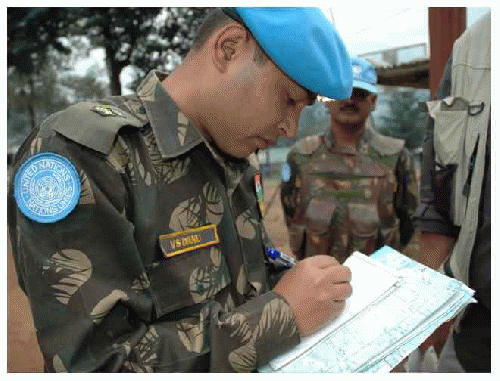GOMA, DRC February 16, 2007--Life for a freelance journalist far removed from the safety net of big time media support would be all but impossible if it were not for the MONUC mission in DRC. It seems that the "oil for food scandal" is still fresh in many American's minds, but I can tell you that there is an overlooked and under-appreciated United Nations mission in Africa that desperately needs U.S. support. As of December 31, 2006 MONUC supported 17,390 military and 1,075 police, who are helping to hold together a fragile peace after the election of Joseph Kabila in the Democratic Republic of Congo.
Main troop contributors are India, Pakistan, Bangladesh and Uruguay. The cost of peace does not come cheap, however, and the tab from July 2006 to June 30, 2007 is estimated to be $ 1.138 billion. The MONUC mandate expired on February 15, this month. Over 4 million have already perished in what has been termed Africa's World War, and it is paramount that the peacekeepers are allowed to remain. Without MONUC support, journalists would have neither transportation nor access to these stories.
I visited the MONUC compounds in Goma and Lubero. Both are located in northern Kivu Province, which has seen most of the conflict in recent months. I have witnessed villagers running from rebel troops with my own eyes, and NGOs and conservationists stationed in these areas have barely lifted a finger to help the greater population-meaning displaced persons who are not immediately connected to their programs. There have been a few worthy attempts, but they fall far short of the need. In fact, conservationists are training armed militias in Virunga National Park. I tended to support this effort before my tour here. That all changed when I witnessed three terrified, unarmed villagers running from an armed fracus 2 km down the road, where the Mai Mai (local) rebels were clashing with the regular army. The conservation guard who was with us wanted to allow the villagers to hop on for a quick ride out of the area, but they were denied entry into our vehicle by the British "conservationist" (read mercenary) who overruled his "troop." My impression is that the international community is allowing trained mercenaries to develop their own private armies within the Virunga Park. Without the MONUC presence I am not sure that this story can be monitored, or that the villagers will be safe from armed irregular militia or armed environmentalists. It is all about access. Unless you go there, you have no idea what is taking place, or not.
An idea has been floated to turn Virunga Park into a green zone with controlled access. I originally supported this approach until I witnessed the almost total lack of wildlife in Virunga. There is no more point in throwing good money after bad there. Until the humanitarian crisis is solved and peace totally restored, this will prove impossible. With nothing to eat in the manner of protein, bushmeat will be the dinner of choice until a baseline agronomic economy is established.
An Indian military attache' told me that even the regular Congolese Army, the FARDC, has no real command structure, discipline, or decent training. The soldiers who wear the uniforms of FARDC are stationed along the main road, and the young recruits, some of them child soldiers, are placed along the village roads. This presents a big problem without an identifiable uniform. I met such a group when our vehicle became stuck in the mud for two days on the road into Tayna Reserve.
On the other hand, I must say that after encountering hundreds of armed militia of various factions, uniformed and not, I never at any time felt threatened. I attribute this fact to my MONUC press badge, which was respected at every checkpoint, and I am sure had something to do with the child soldiers deciding to guard us as we were dug out of the muck. If opposing military groups, villagers and local officials alike respect the insignia of MONUC, that obviously says that something is going right in a region that has seen more than its share of wrongs.
MONUC's website is available to anyone with Internet access, and is not controlled by passwords. Up-to-date press releases, photos and more are all available there. Travel restrictions are also noted. The maps are probably the only accurate representations of the current roads in DRC. I could not have done my job without their support. MONUC flies regularly into areas that are completely inaccessible by land vehicles, and journalists are more than welcome to hop a ride if they are covering a humanitarian mission. MONUC will not take responsibility for injuries or health related issues of journalists, but they will assist you in any way possible.
This assignment to DRC exemplified the importance of access to the situation on the ground-or ground truthing. I entered DRC as a conservationist who was a bit skeptical of the United Nations. I am leaving as an avowed humanitarian who remains in total support of the MONUC mission. Let's take the guns away from the conservationists and the insurgent military. Keep MONUC in place until law and societal order is restored to DRC. For those who are totally focused on the animals, wildlife will have no chance of survival if the NGO community squanders dollars that belong in the villages. The animals will not survive unless the humanitarian crisis is seriously addressed.
The UN Council is expected to agree to the request by the Democratic Republic of Congo to delay its substantive review of the mandate of the UN Mission in the Congo. How long this technical extension might blast is still under discussion.






